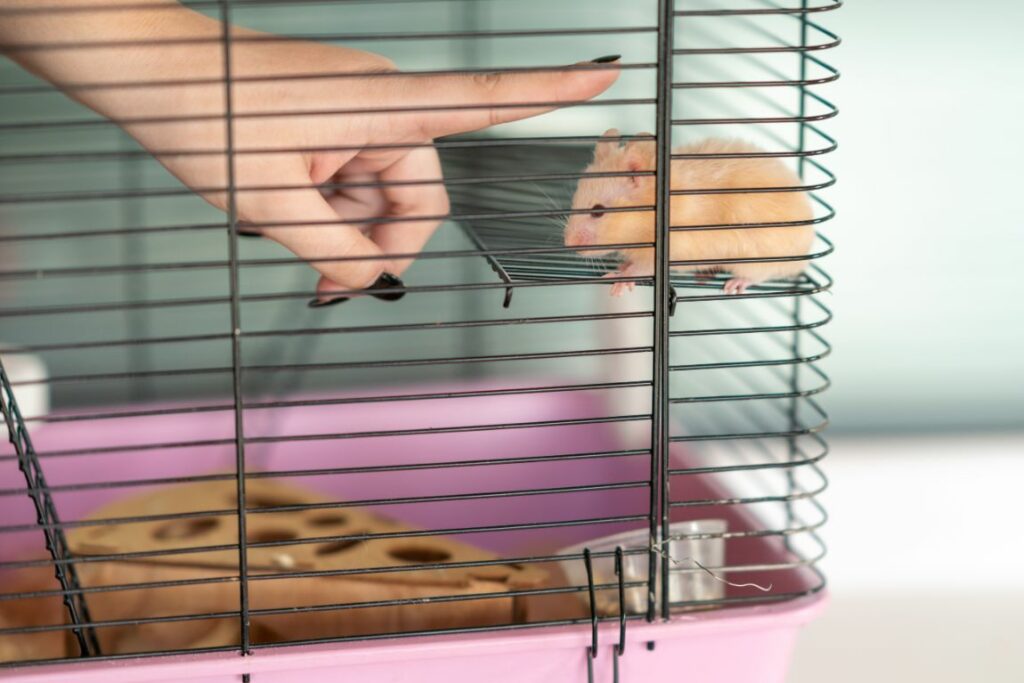Hamsters are cute and cuddly pets that can bring joy and companionship to any home. However, they also come with a distinct smell that can be unpleasant for some.
The good news is, there are several ways to prevent and treat hamster smell. In this complete guide, we will explore the causes of hamster smell, how to prevent it, and how to treat it when it occurs.

Understanding the Causes of Hamster Smell
The Science Behind Hamster Smell
Hamsters have scent glands on their bodies that produce a musky odor. This odor is a natural part of their communication and can be intensified when they are stressed or scared. Additionally, hamsters produce urine and feces, which can contribute to the overall smell.
They also mark their territory. Males are especially guilty of this and can therefore leave a stronger smell.
Common Reasons for Excessive Hamster Odor
There are several reasons why hamster odor may become excessive. These include:
- Poor ventilation in the cage
- Lack of cleaning and maintenance
- Inappropriate bedding and litter
- Health issues
Now that we know the causes of hamster smell, let’s explore how to prevent it.
Preventing Hamster Smell
Regular Cleaning and Maintenance
The best way to prevent hamster smell is to keep their cage clean. This includes:
- Removing any uneaten food daily. Removing uneaten food daily is important because if it’s left in the cage it will start to rot which can not only bring about nasty smells but can also pose a threat to your hamster’s health.
- Spot cleaning the cage weekly. Prevention is the best cure!
- Cleaning the entire cage every 2-4 weeks. While spot cleaning goes a long way, a deep cleaning is necessary once every 2 to 4 weeks.
- Replacing bedding and litter as needed. Your hamster will likely poop and pee on its bedding. In addition, it will scent mark it. Because of this, it’s essential that you replace it often.
Proper Cage Setup and Ventilation
Proper ventilation is essential to prevent hamster smell. Make sure the cage has enough airflow by:
- Choosing a cage with proper ventilation
- Keeping the cage in a well-ventilated area
- Avoiding overcrowding the cage
While proper ventilation is important, it’s also important that you do not house your hamster in a drafty area as that can cause health issues.
Choosing Appropriate Bedding and Litter
Choosing the right bedding and litter can also help prevent hamster smell. Avoid using cedar or pine bedding, as these can be harmful to your hamster’s respiratory system. Instead, opt for unscented paper-based bedding and litter.
Treating Hamster Smell
Natural and Homemade Solutions
There are several natural and homemade solutions you can use to treat hamster smell. These include:
- Sprinkling baking soda on the bedding and litter (be careful to only sprinkle a small amount. Too much is not good because if your hamster ingests too much baking soda it can cause issues)
- Placing charcoal or activated carbon in the cage
- Using vinegar to clean the cage
Commercial Products for Hamster Odor Control
There are also several commercial products available to help control hamster odor. These include:
- Odor-neutralizing sprays and powders. There are several sprays and powders available that can help you deal with hamster smell.
- Scented bedding and litter
- Air purifiers and filters
When using commercial products, be sure to choose ones that are safe for your hamster and follow the instructions carefully.
Dealing with Health-Related Hamster Smell
Understanding Hamster Health Issues that May Cause Odor
In some cases, hamster smell may be due to underlying health issues. These can include:
- Urinary tract infections
- Dental issues
- Digestive problems
If you suspect your hamster’s odor is due to a health issue, it’s important to take them to the vet for an examination.
Addressing Health Concerns with Vet Help
If your hamster’s odor is due to a health issue, your veterinarian may recommend treatments such as antibiotics, dental care, or dietary changes. It’s important to follow their recommendations carefully to ensure your hamster’s health and well-being.
Conclusion
Hamsters are wonderful pets that can bring joy and companionship to any home. However, their smell can be a concern for some. By understanding the causes of hamster smell, preventing it through proper cleaning and maintenance, and treating it with natural or commercial solutions, you can keep your hamster’s odor under control.
And if you suspect your hamster’s smell is due to a health issue, don’t hesitate to take them to the vet for care. With a little effort and care, you and your hamster can enjoy a happy, healthy life together.
- How Long Do American Eskimo Dogs Live? Important Factors and Care Tips - September 29, 2023
- Do American Bulldogs Need Grooming? Essential Tips and Care Guidelines - September 29, 2023
- Do Bengal Cats Enjoy Playing? Essential Tips for Keeping Them Active - September 29, 2023